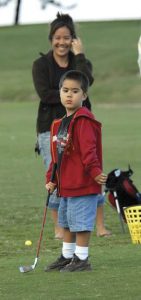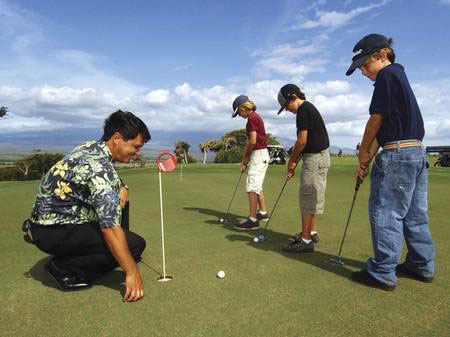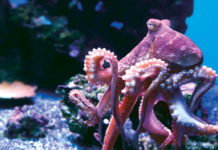Story by Matt Thayer
 My first golf club was an old three-wood that my dad shortened down to five-year-old size by cutting its steel shaft in half with a hack saw. He fashioned a grip out of black electrician’s tape, and we were soon smacking golf balls around the yard.
My first golf club was an old three-wood that my dad shortened down to five-year-old size by cutting its steel shaft in half with a hack saw. He fashioned a grip out of black electrician’s tape, and we were soon smacking golf balls around the yard.
His smooth swing lofted graceful chip shots that bounced next to target trees, or even off the top of the well in our front yard. I was lucky to occasionally connect with low-line drives that my dad called “worm-burners.” I don’t know how many thousands of hours we spent chipping balls around the yard or playing rounds of golf together, but I cherish every one.
Some of our most important conversations occurred between shots as we walked side-by-side down the fairway. We hashed through issues weighty and small as he helped set the path for the rest of my days.
The lessons kids absorb on the links go far beyond mastering how to make birdies, not bogeys.
“Golf is a sport for life and it is a sport of life,” says Maui PGA pro and high school coach Howie Kihune. “There are a lot of things you learn in golf, especially integrity. You take that forward in life. It’s like life: some days you have your ups and downs. Golf’s the same way. You have some good holes and some bad holes. After a bad hole you have to put it away and move on to the next one.”
 Rick Castillo, King Kamehameha Golf Club’s director of operations and memberships, learned that lesson growing up, while trying to keep pace on the scorecard with his sister and brothers. The Castillo family matches must have been doozies, since all five siblings eventually followed in their golf-professional father’s footsteps to become pros themselves. The bonds forged in the fire of their competition continue to keep the family strong.
Rick Castillo, King Kamehameha Golf Club’s director of operations and memberships, learned that lesson growing up, while trying to keep pace on the scorecard with his sister and brothers. The Castillo family matches must have been doozies, since all five siblings eventually followed in their golf-professional father’s footsteps to become pros themselves. The bonds forged in the fire of their competition continue to keep the family strong.
“As boys it was very competitive,” Castillo shares. “To this day, the best time to play golf is with my dad and my brothers and sister, and even my mom. She plays golf, too.”
Castillo, who serves as vice president for the Hawai‘i State Junior Golf Association, thinks the sport is one of a few that offer a lifetime of fun and competition.
“What other sport can you start at age seven and keep on playing until you’re 70?” Castillo asks. “You can play golf with your mom, your dad, your sister, your brother, your grandma, your grandpa, your wife or your husband, for your entire life.”
LPGA teaching professional Sandy Nickerson provides instruction during winter months at Elleair Golf Course and Pukalani Country Club. She says studies show that playing golf may even make kids smarter in school.
“Outside of it being a great sport, you’ve got many things it gives to the kids,” Nickerson says. “One thing is personal growth, and to let kids connect with themselves as well as with others. The social connection is very important. Golf, as a sport, teaches various skills such as honesty and commitment, sportsmanship, focus, communication skills and conscientiousness—something that I think is lacking in our society.
“Studies show kids who golf do better in school. It helps with their concentration. It creates a relationship between parents and kids that may not develop in any other place.”
Getting potential pros off the Sony Playstation and on the course can be relatively easy on Maui. Most of the island layouts are open to the public and nearly every one has a driving range. There are also programs and clinics that allow kids to sample the sport without investing in equipment. (See sidebar for a list of opportunities in July and August.)
Once you hit the course, however, you may find that golfing with your child is not always an enjoyable experience. The learning curve is steep and frustrations can boil forth, especially when things get competitive. Nickerson has seen juniors abandon the sport when the pressure becomes too much.
“There is a fine line of parenting in golf,” she says. “They [juniors] may become frustrated and walk away from the game. In the right environment, [golf] can teach us other things than just performance. We can see on tour that the best players in the world do not always win.”
Maui Junior Golf Association President Eric Miyajima has learned to walk that line while raising a pair of talented golfers. His daughter Shayna attended San Diego State University on a full-ride scholarship; she is now an up-and-coming pro on the Futures Tour. His daughter Kaitlen is a high-school standout who also hopes to play in college.
“The parent is supposed to be there in a supportive role, not a dictating role,” Miyajima says. “If parents push too much, the kids are either going to hate the game or they are going to hate the parent—one of the two.”
While many parents hope that their junior golfers can translate hard work on the links into offers of college scholarships, or maybe even a pro career, not everyone has the skills or temperament to take that next step. Parents need to follow the lead of the kids themselves as they gauge just how hard to nudge.
“It depends on the individual,” says Miyajima. “If they want it, then it is OK. If they don’t, then it is going to be a disaster.”
The commitment of time and finances can be substantial for parents of young competitors. Golfers with scholarship dreams need to compete around the state and the Mainland to appear on college coaches’ radar screens. Along with travel expenses there is the basic cost of equipment and instruction. Miyajima says through the years he has spent about $30,000 each summer to have his daughters play in tournaments around the country.
Coaching can be critical. Miyajima and Nickerson believe it is best to leave the bulk of instruction to a skilled teacher.
All parents need to do is lead by example. Follow the rules, use proper etiquette, play hard and have fun. That will give your child skills to last a lifetime.





